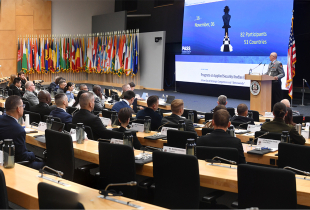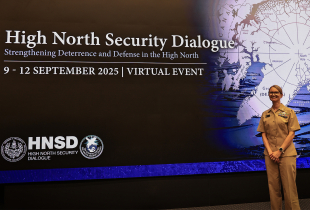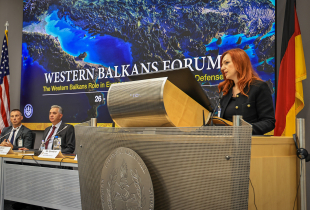
Marshall Center Hosts Security Policy Seminar for Romanian Parliamentarians
By Christine June
Public Affairs Office
George C. Marshall European Center for Security Studies
GARMISCH-PARTENKIRCHEN, Germany (Nov. 22, 2017) – Romania has the highest growth in defense spending in Eastern Europe after achieving NATO’s two percent of its gross domestic product on its defense budget this year.
To learn how to effectively spend this money to protect their fellow citizens, parliamentarians from the Committee for Defense, Public Order and National Security of the Chamber of Deputies of Romania looked to the George C. Marshall European Center for Security Studies. The Marshall Center is a German-American international security and defense studies institute, based here.
ROMANIA’S IMPORTANT ROLE
“Romania is experiencing very strong economic growth, which was one of the things discussed here the last two days,” said Dr. Matthew Rhodes, Marshall Center’s director of the Central and South Eastern Europe Non-Resident Program.
Rhodes and his team hosted a tailored seminar in security policy for 13 members from this committee Nov. 16 and 17.
“This seminar was important because of the role that Romania plays within its neighborhood, and the broader security effect it has even beyond its own borders,” Rhodes said. “Romania shows particular commitment to building a strong partnership with the United States, Germany and NATO.”
EUROPE’S CURRENT SECURITY CHALLENGES
Majority of the seminar topics were requested by the committee, said Retired U.S. Army Lt. Gen. Keith Dayton, Marshall Center director.
“These topics reflect the multiple current security challenges that Europe is facing, as well as the particular roles of parliaments in addressing them,” Dayton said. “We often speak now about different kinds of threats along the eastern and southern flanks of Europe, and Romania’s history and geographic location connect it to both.”
He cited the fact that Romania shares borders with Ukraine and the Republic of Moldova, whose conflicts with Russia have shaken assumptions about a peaceful post-Cold War order in Europe.
Topics included the role of parliament in defense budgeting and planning, state secrecy versus transparency, approaches to good governance to counter corruption, cyber security and energy security.
“We had very concrete discussions about energy related matters and security in the Black Sea Region,” said Dorel Caprar, chairman of the Defense, Public Order and National Security Committee of the Chamber of Deputies of Romania. “This is important because in the future, vital decisions will have to be made in parliament.”
ENCOURAGING PRODUCTIVE DEMOCRATIC PARTNERSHIPS
Caprar said they learned new and useful information on topics that the committee comes across daily in their work, like how to purchase equipment for the armed forces, decide on a supplier for military equipment and liaison with foreign companies investing in the defense sector.
“We also learned more about our strategic partners within NATO, European Union and the U.S.,” Caprar added. Romania joined NATO in 2004 and the EU in 2007.
“Seminars like this one are welcomed for members of parliament because in our legislative work, we come across many of the issues and problems that we need to regulate,” he said.
The Marshall Center hosts tailored seminars for parliament members of countries not only from the Central and South Eastern Europe, but also from Central Asia and Black Sea Eurasia.
“These seminars certainly play into our overall mission to encourage productive democratic partnerships in the security and defense fields,” said Rhodes, who added that two to three seminars like this one is held every year at the Marshall Center for countries in the Central and South Eastern Europe. “It’s important to include parliaments in our outreach programs as they play an important role in overseeing defense in passing legislation that affects the ability of their countries to respond to security challenges.”


